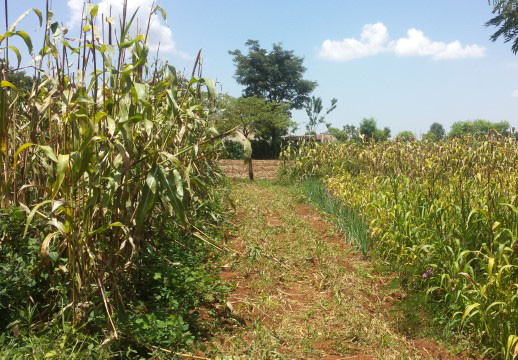Twenty years ago, frustrated by the assertion that ‘organic is all very well for the rich, but it will never feed the world’, I took a two-month sabbatical to Sub-Saharan Africa to see for myself. I visited one-acre subsistence farms, where 70 per cent of the food grown was consumed by the family, and large-scale export farms, one of which had its own fleet of DC-10s flying beans, mangetout and flowers back to Europe.
Mostly it was a depressing catalogue of deforestation, corruption, charity dependence and pesticide poisoning; the best land and water were used to grow for export, while climate change and conflict increased food insecurity at home.
I struggled to find encouragement, until my Ugandan friend Timothy Njakasi took me on the back of his motorbike to what turned out to be the most inspiring and hope-giving farm I have ever seen. Two acres of forest garden fed a family, two cows, several pigs and chickens, while providing a good surplus for sale, timber and fuel, without the ecological devastation that is modern agriculture.

With no monocultures (large areas of one crop) and almost no bare ground, it was like a more open version of the surrounding forest. In multi-layered cropping, mature forest trees covered a second canopy of jackfruit, banana and papaya, over coffee, cacao and vanilla, with small areas of annual (needing replanting every year) veg on the ground.
There were no artificial pesticides or fertilisers, and very little of the back-breaking cultivation needed to sow and maintain monocultures of annual crops. Through his knowledge of the subtle interactions of plants, soil and animals, Timothy’s farm was many times more productive, with less work, while creating biodiversity and fighting climate change.
Ever since, we have supported this sort of farming: first by helping Timothy’s farm become the Kasenge-Riverford Organic Training Centre, and then through the charity Send a Cow, which trains families in sustainable farming. Our next three-year Send a Cow project will support ‘Push-Pull’: a technique to grow naturally pest-repellent plants alongside maize, to combat the pests that are reducing maize yields by up to 80 per cent.
I will be participating in an online discussion about Push-Pull with Send a Cow on Wednesday 4 Nov at 6pm, via Zoom; if you’re interested in watching, you can book your free place at Sendacow.org/riverford-send-a-cow or call 01225 874 222.













There is a very good booklet available at http://www.viva.org.uk “Feed the world” Jeremy Rifkin explains all the issues and why “meat makes the rich ill and the poor hungry”.
I visited Mali two years ago and having been a customer of Riverford and now a member of an organic co operative in Spain I was interested to investigate rural farming on my way through the Sahara,Mauritania and Mali itself. I make jam and am looking to set up a small production plant. I was really impressed by the quality of the produce in West Sub Saharan Africa and have made contact with a female entrepreneur and we are considering setting up a women’s co operative. They have arabic roots and use animal manure to fertilise. Along with the river cycles the farming is natural and so verdant and productive. The main problem here is creeping jihadism and the danger of fighting in certain areas. However on the main peaceful! I need to investigate pest control however. The livestock are camels, sheep and goats and again all naturally pastured. Watching them drink at the oases wells in turn is incredible.
Really good to hear about Send a Cow’s new PushPull project. Having spent most of my life working in the voluntary sector, I don’t hesitate in rating Send a Cow as the single most positive, effective and enjoyable charity I worked for. Not a penny of the money raised goes to waste.
Thousands of families in SubSharan Africa have been lifted out of poverty through being trained in sustainable farming. And their ethos of ‘Passing on the Gift’ ensures that for every one farmer who is given direct help, a further ten benefit.
Thank you! We were also so impressed with that ethos, the way skills are shared and communities support each other to grow and thrive with the help of Send A Cow.